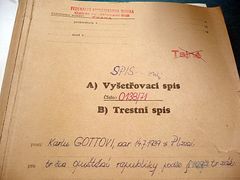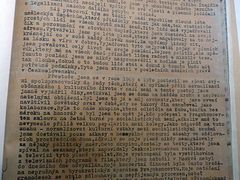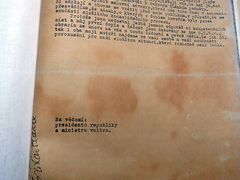Prague - The year was 1971. The new Czechoslovak leader, Gustáv Husák, had just been elected general secretary of the Communist Party, and the pop music star Karel Gott with the brothers Štaidl, the composers of his biggest hits, emigrated to West Germany.
So far it has been believed that Gott then received a letter from Husák asking the most popular Czech singer to come back home. That is also how Milan Kundera described the situation in his novel Kniha smíchu a zapomnění (The Book of Laughter and Forgetting).
But the archives of the communist-era secret police, StB, have now yielded a rather different version of the story. The declassified file the agency kept on Gott includes a letter sent by Gott to Husák, in which the singer explains his reasons for staying in the West and lists conditions under which he would be willing to return.
A copy of the two-page letter has been made available to Aktuálně.cz. Gott has confirmed the authenticity of the letter, but has refused to meet the internet daily and see the letter in person. "I'm going abroad and I won't have time even after I come back," he said. "And even if I did, I don't want to go back to these things."
Secret police on alert
The letter, written on a typewriter, addressed to the newly elected Communist leader and signed by Gott and the brothers Štaidl, says it was sent from Hamburg on 21 July. The year is not stated, but the content of the letter and other documents in the file suggest it was 1971.
Gott and his composers were at that time staying abroad without permission from Czech authorities. They had gone to West Germany with a band in early May, but were supposed to return in a week. Instead, the trio announced they were staying. The German media speculated that Gott had decided to live in exile, wile back in Czechoslovakia the StB was on high alert and ready to launch prosecution of the defectors.
To dispel the doubts about the nature of his acts, the icon of Czechoslovak pop music wrote a letter to Husák explaining the reasons for his reluctance to return home. In it, Gott expresses support for the "normalisation" process, a newspeak term for a crackdown on civic freedoms after the 1968 invasion of Czechoslovakia by Soviet tanks. The singer says he only decided to emigrate because the changes in the cultural life had hampered his artistic career.
The banned beauty
"Although I and all my co-workers in 1969 and 1970 joined the ranks of those who sincerely hoped for a normalisation of the civic and cultural life in our country," says the letter, "and although I clearly expressed this position by my acts, with every step I took I met insurmountable obstacles. ... Although my songs have never engaged in any political movement or group, the lyrics of my songs have been blacklisted and the Czechoslovak radio and television were not allowed to broadcast them. My performances have been cut out of TV shows and a film I shot in Moscow has not been screened to this day. ... The institutions we needed for our work have created an atmosphere in which it was impossible to create anything beautiful. ... The situation was hopeless and that motivated the decision I and both my authors have made."
At the end of his letter, Gott assured the country's supreme leader that he did not plan to stay abroad permanently, but said he would only come back under certain conditions.
"I and my colleagues are currently working on the soil of western Europe, where I and my friends act as citizens of the Czechoslovak Republic, who we want to remain under all circumstances. ... We want to come back before our home audiences, provided that we are convinced that the interventions mentioned above in my letter were only part of a complex consolidation process. ... I strongly believe that I and both my authors will find in you and your wisdom some understanding for our difficult situation, which is certainly not easy."
The letter is concluded by a note that copies of this letter are also being sent to the country's president and interior minister.
'Good man this Husák'
The Czechoslovak leader then helped Gott and hic companions to return without being prosecuted.
"Husák invited us. Not by a letter, but through a trade representation in Frankfurt," Gott has told Aktuálně.cz. "They invited us and told us that there was this offer from the supreme boss, and that haggling over the phone or mail was no good. They said he guaranteed the case would be clarified and there would be no prosecution and no one would do us any harm. We went back to settle the case and then resumed our tour [abroad]."
The singer still has high esteem for the controversial Czechoslovak leader: "I found him a very good man, intelligent; even abroad he was very well regarded. He invited us and we accepted. Since he kept his word I would not be appropriate to talk about him badly."














